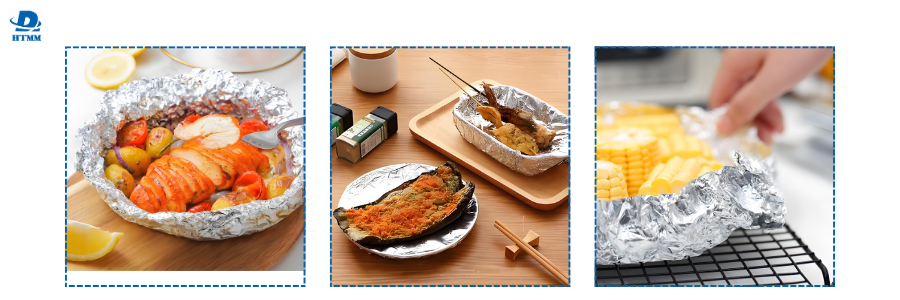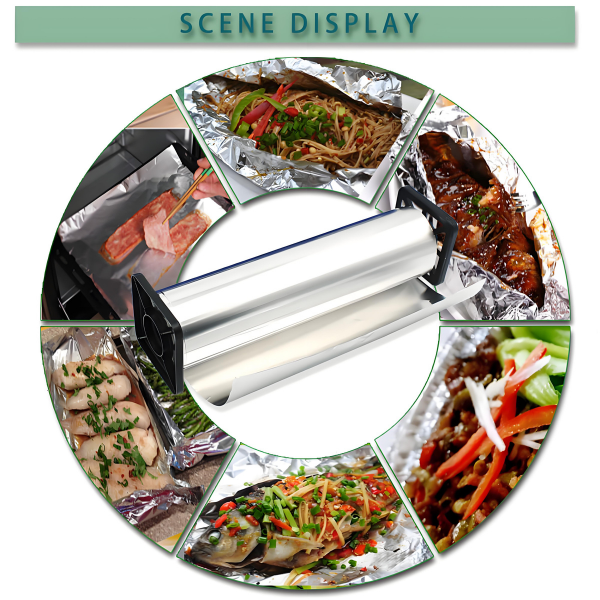Positive barrier properties:
Aluminum foil is a powerful barrier for protecting food from air, moisture, light and bacteria which helps to protect the freshness and taste of your food. This property is able to preserve the shelf life of packaged food and keep it from spoiling. Thermal insulation:
Aluminum foil for packaging food provides thermal insulation due to its high density and reflectivity which helps in maintaining the temperature of hot or cold foods. Thermal insulation is particularly important for temperature-sensitive products such as frozen or refrigerated foods that need to be packaged and transported without damage. It is commonly used on take-out foods to keep the temperature of food delivered.

Flexibility and Durability:
A strong, durable and highly flexible material that can be folded into any shape and pressure- and puncture-resistant, it remains intact through deformations. So, aluminum foil is appropriate for wrapping heavier or more fragile foods. The flexibility of aluminum foil allows you to make unique and customized packaging like bags, containers etc. This flexibility makes it possible for us to create packaging solutions that are space saving and user friendly. The most eco-friendly packaging material out there is aluminum foil because it can be recycled without losing any quality or functionality. This flexibility meets the need for eco-friendly packaging and is cheaper as well. In addition to food packaging, aluminum foil is an inexpensive, eco-friendly and reusable packaging for food manufacturers. Aluminum foil is also very versatile and can be used in many food packaging applications ranging from packaging of small quantities of food to multi-layer packaging. One of the reasons behind its versatility is that it can work in diverse food categories, ranging from perishables and storable foods to liquid packaging and solid packaging. Aluminum foil is popular because of its adaptability, large supply chain and customer base which make it a viable food packaging material in many industries and applications.
Food grade aluminum foil is manufactured in accordance with manufacturing procedures and quality control systems to meet the most stringent safety and cleanliness standards for direct contact with food. How to get food grade aluminum foil?
Preparation of raw material: High purity, low impurity aluminum alloy (e.g. 8011 or 3003 series) is used to produce aluminum foil. This is because the alloys are made of single metal types with very few impurities and are also clean materials that do not emit any harmful chemicals. Surface preparation: The aluminum surface is carefully cleaned and treated to remove any dirt or debris. This can involve scraping, chemical cleaning, annealing or other means in order to achieve a clean, food grade surface. Coating and polishes: After cleaning the surface of the aluminum foil, it can be coated with a thin layer of varnish or polymer. They can also prevent corrosion in the food when the metal touches it by improving food safety for aluminum foil. The foil can also be laminated with other food grade materials (plastic wrap or paper), thus providing an additional layer that can be used in more packaging applications. Food-grade aluminum foil is thoroughly studied and tested to meet regulatory as well as food industry standards. Heavy metals, shipping chemicals and other potential food contaminants are tested on products. Visual inspection is used to detect defects, irregularities or flaws. This guarantees that the foil is food safe.

Wrapping Food and Packaging: Food is wrapped in aluminum foil to protect it from damage during shipping or storage. This refers to packaging, manufacturing specifications and color as well as other inspections. Video Safety Regulations Laws: Products sold must comply with laws and regulations established by government agencies such as the U.S. Food and Drug Administration (FDA), REACH, or other such agencies in other countries. Aluminum foil is food safe when it meets these requirements. Given the complexity of production and the requirement for continuous quality control, it is possible that aluminium foil could be regarded as "food safe" and used in many food packaging products. There are two primary applications of aluminum foil in the kitchen: cooking and grilling. Now, we are going to explain the characteristics of aluminum foil that are applicable for both these two purposes. Grilling foil is generally thicker and stronger than regular kitchen foil. Aluminum foil for grilling typically ranges from 0.016 to 0.024mm (16-24 microns) in thickness. Thicker foil means that you can use it for grilling without the risk of the foil breaking, burning or burning out.
Thick grilling foil will not crack, tear or lose its shape when handling hot foods, moving food in the oven or folding food. High temperature: Thick paper can withstand higher temperatures without breaking. Its thick thickness make aluminum foil quite durable so it does not tear or crack.
In general, foil for cooking or baking will be thinner than those used for grilling. The thickness of a typical kitchen foil is between 0.010 and 0.016 mm (10 to 16 microns). These foils have a soft surface, can be stuffed with food and are easily made into foil bags.
Kitchen foil is a lot more flexible and versatile, but grilling foil might have a higher strength and durability.
It is heat-resistant, durable, and strong. (0.016 to 0.024 mm)
Baking foil, on the other hand, is thinner and lighter weight as well as more compatible with wrapping food. (0.010 to 0.016 mm)
There is no straightforward answer to this question, as it depends on the use case scenario for your foil, and if you plan to store it in a fridge or subject it to more elevated (baking) temperatures than for regular baking and cooking.
More than 10 years of experience in aluminum foil production, HTMM Aluminum foil factory can supply various standard aluminum foil packaging. They have an entire manufacture process in their factory and can provide customize Aluminum foil based on your request. HTMM Aluminum Foil Factory enables customers around the world to get aluminum foil that suits their needs.





